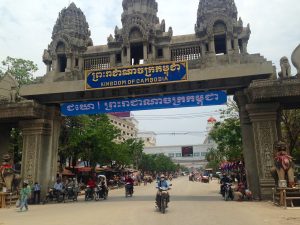Thai military commanders have voted indefinitely to shut their country’s 817-kilometer border with Cambodia and will impose domestic laws on Cambodian citizens living in villages along the disputed frontier, prompting a strong protest from Phnom Penh.
The decision follows last week’s flare-up at Prey Chan village in the Cambodian province of Banteay Meanchey, where Cambodians fought with sticks and stones against Thai soldiers who fired rubber bullets, sling shots, and smoke bombs after dividing the village with razor wire.
That clash has also dashed initial hopes that the appointment of Anutin Charnvirakul as Thai prime minister would improve relations between the two countries, which fought a five-day undeclared war in July that ended with a Malaysian-brokered ceasefire that is struggling to hold.
On Saturday, Cambodia’s Foreign Ministry lodged a “strong protest and objection” against Bangkok’s intention to apply Thai domestic law on Cambodian nationals in Chouk Chey and Prey Chan Villages in Banteay Meanchey.
It said a Thai Army issued a public warning that included the imposition of penalties up to life imprisonment or even the death penalty for so-called “acts against” Thai sovereignty.
“Applying severe criminal penalties, including capital punishment, against Cambodian nationals engaged in peaceful protest also constitutes a grave violation of fundamental human rights guaranteed under international law,” the ministry said.
Shortly after the September 17 confrontation, the Thai military issued Cambodians a 30-day deadline to vacate the land around Prey Chan, where, according to Phnom Penh, “hundreds of households, comprising about a thousand inhabitants” will be affected.
Thai-based sources told The Diplomat that the flare-up at Prey Chan dated back to the end of Cambodia’s 30-year civil war, when a refugee camp was established on the current site to house civilians fleeing the Khmer Rouge.
“United Nations peacekeepers arrived in the early 1990s, and as the war was coming to its close, most Khmers began returning home. But a few families stayed on, and they built houses on the site and settled in, which the Thai military is now saying was built on Thai land,” one source said.
In Phnom Penh, the government has claimed Thailand was planning to seize territory in 17 locations in provinces from Pursat to Koh Kong in Cambodia’s west and southwest, and called for international pressure to thwart those ambitions.
Prime Minister Hun Manet has pleaded his nation’s case in letters to Malaysian Prime Minister and ASEAN chair Anwar Ibrahim, Chinese President Xi Jinping, United States President Donald Trump, French President Emmanuel Macron, and U.N. Secretary General António Guterres.
He wrote that current events were leading to a “widening of the scale and scope of the conflict zone” beyond the initial areas of conflict in Preah Vihear and Oddar Meanchey provinces, and urged full respect for the ceasefire and recent agreements struck during recent talks.
“It is regrettable that Thai military activities in violation of the ceasefire have continued and even extended beyond the original areas of conflict,” Hun Manet wrote, adding that the conflict posed a grave threat to peace and stability in the wider region.
Those letters were sent on September 17, but Trump may not have received the memo. Over the weekend, he claimed to have ended the war in Cambodia – as part of his broader success in ending six wars in six months, which has baffled military analysts.
Cambodia has nominated Trump for the Nobel Peace Prize for his diplomatic efforts and the pressure he applied to both sides – along with China – during the July talks that delivered the ceasefire.
But the military voted to maintain the border closure indefinitely, and applying Thai law over Cambodian citizens along the frontier is perhaps indicative of the real issues confronting negotiators attempting to resolve the conflict, particularly within ASEAN.
Such decisions are political and should rest with Anutin’s government.
This vote by the military, however, is a demonstration of the overarching power the Thai military holds along the frontier, and the acrimonious issues that have beset the two countries cannot be resolved quickly. Many in Phnom Penh fear the worst is yet to come.
Trump’s quest for a Nobel Peace Prize might have to wait.




























